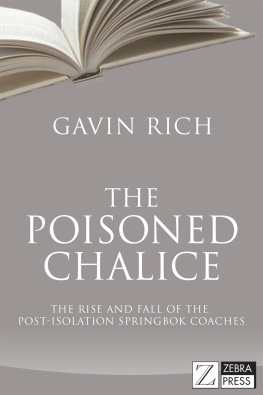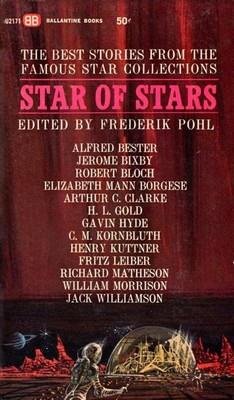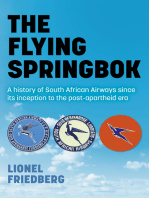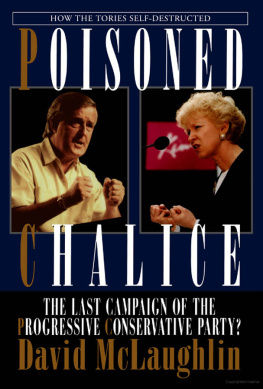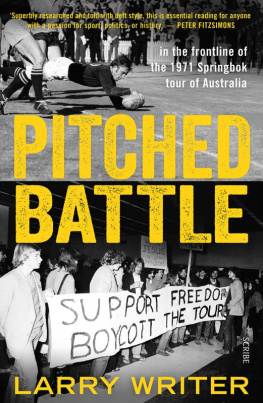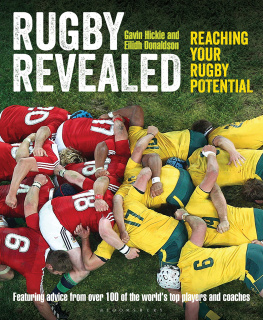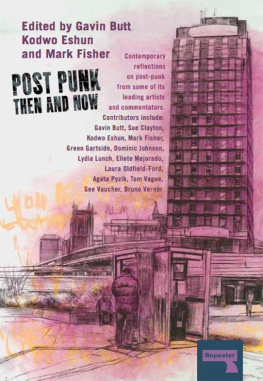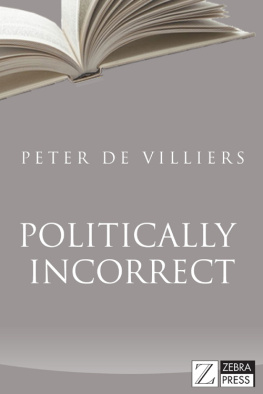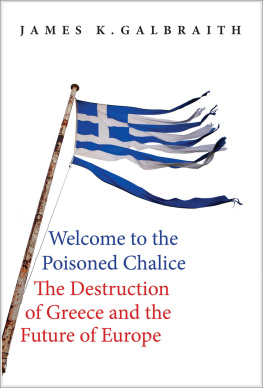THE
POISONED
CHALICE
THE RISE AND FALL OF THE POST-ISOLATION SPRINGBOK COACHES
GAVIN RICH

Published by Zebra Press
an imprint of Random House Struik (Pty) Ltd
Reg. No. 1966/003153/07
Wembley Square, First Floor, Solan Road, Gardens, Cape Town, 8001
PO Box 1144, Cape Town, 8000, South Africa
www.zebrapress.co.za
First published 2013
Publication Zebra Press 2013
Text Gavin Rich 2013
All rights reserved. No part of this publication may be reproduced, stored in a retrieval system or transmitted, in any form or by any means, electronic, mechanical, photocopying, recording or otherwise, without the prior written permission of the copyright owners.
| PUBLISHER: | Marlene Fryer |
| MANAGING EDITOR: | Ronel Richter-Herbert |
| PROOFREADER: | Louis Greenberg |
| INDEXER: | Sanet le Roux |
| TEXT DESIGNER: | Jacques Kaiser |
| TYPESETTER: | Monique Cleghorn |
| PHOTO RESEARCHER: | Colette Stott |
ISBN 978 1 77022 565 7 (print)
ISBN 978 1 77022 566 4 (ePub)
ISBN 978 1 77022 567 1 (PDF)
Disclaimer: Every effort has been made to trace copyright holders and to obtain their permission for the use of copyright material. The publisher apologises for any errors or ommisions, and would be grateful if notified of any corrections that should be incorporated in future reprints or editions of this book.
To my wife, Anna, and children, Kate and Peter, for putting up with my absence, sometimes for weeks but often for months and occasionally for several times a year since I covered my first Springbok tour in 1992
ACKNOWLEDGEMENTS
I have long felt a need for a book that records the journey the Springboks have travelled over the first two decades since South African rugby was unified, but the idea for a book on the coaches came to me when Peter de Villiers and I were on our book tour after the publication of Politically Incorrect, Peters life story and a book on which we collaborated. So many people asked me if all the Bok coaches stories were similar to Peters. My response was that they all had different experiences, but that common threads ran through all of them.
There have been books on the individual coaches, but I resolved to tell the story of the Bok coaches as a collective in the post-isolation era, starting with John Williams, who was appointed in 1992 via a letter that consisted of just one line, through to current coach Heyneke Meyer. I am one of the few rugby writers who travelled on the first tour to France and England who is still on the beat and thus possessed of what someone once referred to as a long view of the coaches, so I felt I was in a position to write the story. As you will see when you read this book, a lot has changed, but a lot has also stayed the same.
Jake White, who has decided he wants to put his South African chapter behind him and start a new life in Australia, was the only living post-isolation Springbok coach who I did not get to interview, and I am indebted to all those, from Williams through to Meyer, who were able to make the time and were willing to be quizzed by a reporter who some of them, during parts of their reign, must have despised.
Its not easy being a Springbok coach, and much of this book is about the pressures they are confronted with. But while the title suggests sympathy with those who have held down the hottest and most pressured position in South African sport, I agree with those who claim that some coaches have used the obstacles as a convenient excuse for their own poor decisions. So not all the coaches will agree with everything I say about them. But then hopefully that should be an indication that Ive done the job I set out to do and that I have been honest. I made a commitment to all of them that I would be fair, and hopefully Ive lived up to that.
To those colleagues who were on the beat in 1992 and have joined me in doing the long haul, my thanks for your companionship over these 21 years. Louis de Villiers, Dan Retief and Mark Keohane are the others who have experienced what I have, and although Dan and Mark have spent some of the past few years off the beat, all three of those guys could have written this story. To Mark in particular, who took some flak from some of the coaches in this book, and maybe even from me, my thanks for the friendship and the shared experiences on those occasions, such as the 2007 World Cup, where we travelled together and shared accommodation.
Talking of good guys, Liam del Carme and Mike Greenaway are strong personal friends with whom I have also shared much of the journey, and I thank them both, as I do Stephen Nell. Craig Ray was a good sounding board when I first started thinking about writing this book. Thanks also to Jon Cardinelli, Clinton van den Berg, Zelim Nel, Jacques van der Westhuizen, Ryan Vrede, Kevin McCallum, Brenden Nel, Andrew Koopman and others who have suffered my madness and resolved to tolerate it.
Talking of madness, a special thanks to Simon Borchardt, who supplied me with 50 scrapbooks of newspaper cuttings he had compiled from 1990 to 2000. As a means to jolt my memory, they were particularly invaluable, and if anyone wants to write a book chronicling sport in our changing country over the first decade of transition, you know where to go. In fact, I might go there myself.
Finally, to my editor, Ronel Richter-Herbert, for pointing me in the right direction when I departed from the chronology of the story from time to time, and just for being patient, and to Marlene Fryer for trusting me enough to bring out this book in what in the end was a much quicker time period than maybe it demanded. Some of the coaches warranted much more than the 10 000 to 12 000 words I dedicated to them, so I hope I have done their individual stories justice.
GAVIN RICH
AUTHORS NOTE
Readers may notice that 11 Springbok coaches of the post-isolation era are featured, whereas officially there have been 12 since 1992. Initially I did intend featuring Gerrie Sonnekus, but after being asked nicely not to by someone close to his family, and realising that the book was already in danger of getting way too long, I resolved to leave that part of the Bok coaching story out. Gerrie departed the job before he effectively had a chance to experience it. I cover the reason briefly at the start of .
1
Mad Coaches Disease
Nick Mallett loves a good laugh, but, like most people, he doesnt enjoy being the butt of a joke. And as usual, South African rugby was making a laughing stock of itself. That explained the former Springbok coachs irritation when he arrived at a Sandton hotel on a crisp Highveld morning in September 2006 for the meeting that the whole country seemed to be talking about.
Rudolf Straeuli, who had been keeping a low profile while trying to recover his reputation following the infamous events that tarnished the Springboks 2003 Rugby World Cup campaign, wasnt doing cartwheels of delight either as he flew in from Durban.
As for Ian McIntosh well, as an early victim but also a long-standing survivor of the weird, confusing and often cruel machinations of South African rugby politics, the wily veteran had seen it all before. He had, in fact, twice before attended meetings similar to the one he was about to take part in now once when he himself was the Bok coach, when Louis Luyt had summoned 19 different coaches to Ellis Park the week before a Test against England in 1994, and again three years later, when Carel du Plessis was in charge.

